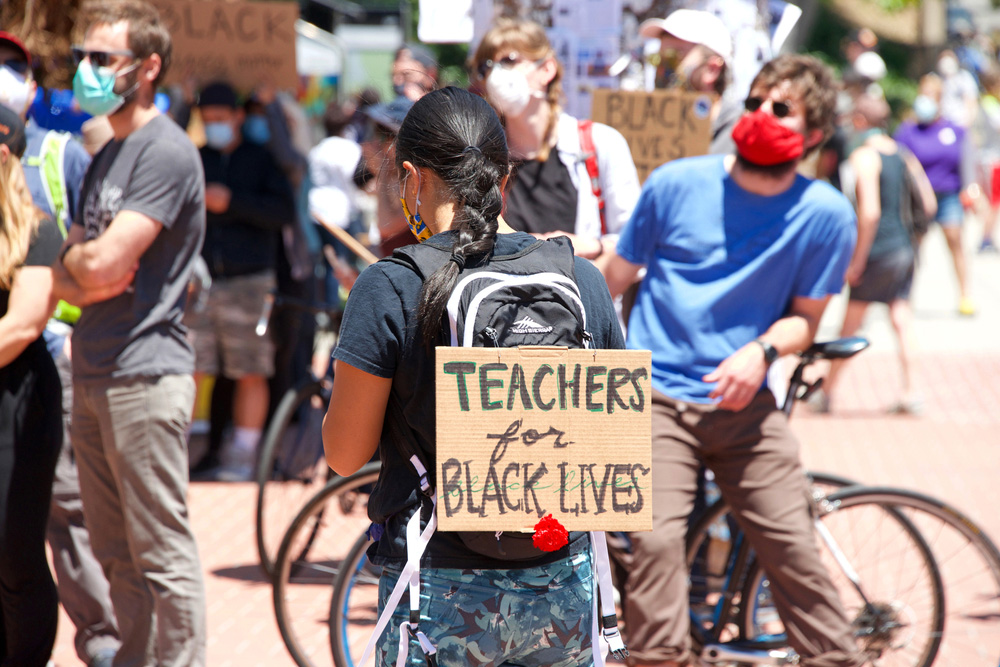Students and teachers in British Columbia have faced formidable challenges during the COVID-19 pandemic, returning to classrooms full time in September 2020 after more than three months away and weathering an exhausting 2021.
But B.C.’s schools have only just begun to grapple with another, much longer lasting pandemic: racism.
One way is by launching district-wide surveys and reports on the systemic and overt racism faced by students, staff and parents who aren’t white.
And this year, both the Burnaby and Prince George school districts released detailed findings on the toll that racism takes in their schools.
A report on Prince George, ordered by the Education Ministry in February and released by authors Kory Wilson and Catherine McGregor in August, found “many examples of behaviours and practices that are clearly discriminatory and systemically racist,” in particular against Indigenous people.
The Prince George district is behind others in terms of best practices, especially when it comes to supporting Indigenous students, the report found.
It also made recommendations that all districts should implement and encouraged a comprehensive investigation into the B.C. education system, in the style of the 2020 “In Plain Sight” report that examined anti-Indigenous racism in B.C.’s health-care system. The province has yet to respond to that recommendation publicly but has been working on its own anti-racism strategy for the school system since 2020.
Prince George school board chair Trent Derrick, who is a member of the Gitxsan First Nation, along with vice-chair Shuirose Valimohamed resigned two weeks after the report was released due to the toll the district’s racism was personally taking on them.
And in Burnaby, a report on racism in schools followed a June 2020 board decision to develop an anti-racism action plan that included community consultations.
At that time, a reckoning against racism was well underway following the police killings of Black and Indigenous people across North America. The summer was full of Black Lives Matter and anti-police brutality actions, some of which received violent police responses.
Questions were being raised in school districts about the harms that the school liaison officer program — which puts police officers in schools — were causing for BIPOC students, in particular Black and Indigenous students. Both the Vancouver and New Westminster districts ended their programs in 2021.
But before the Burnaby racism report could be released, the district faced backlash from students, parents and teachers for retweeting a since-deleted RCMP video of school liaison officers in full uniform welcoming students back to in-person classes.
Last month, the Burnaby district finally released the preliminary results of a survey of 11,000 people regarding their personal experiences of racism in the district. The information reportedly brought some trustees to tears.
In an emailed statement, the Anti-Oppression Educators Collective, a specialist association within the BC Teachers’ Federation, said such reports “are an important first step” and that collecting data on racist incidents and the experiences of racialized people in schools is vital.
But they’re not giving the districts gold stars, either.
It’s a “first step that has come far too late, and has required far too many [Black, Indigenous and people of colour] to explain their trauma and relive it,” says the statement.
“We would also like to state that we do not have to wait to do anti-racist work because we are engaged in collecting data. Anti-racist practices are premised on the basis of action. We don’t need more testimony… to know that there is a problem.”
The collective calls for several actions, including ensuring that school boards are more representative of the races and values of the districts they govern.
Districts must also fund anti-racism initiatives and create district-wide action plans to ensure education can be delivered without discrimination, “because that is the law,” says the statement.
“With proper funding, and a policy that dictates anti-racist values at school district level, our school communities will finally be spaces where we can start to eradicate oppression.” ![]()
Read more: Rights + Justice, Education

















Tyee Commenting Guidelines
Comments that violate guidelines risk being deleted, and violations may result in a temporary or permanent user ban. Maintain the spirit of good conversation to stay in the discussion.
*Please note The Tyee is not a forum for spreading misinformation about COVID-19, denying its existence or minimizing its risk to public health.
Do:
Do not: